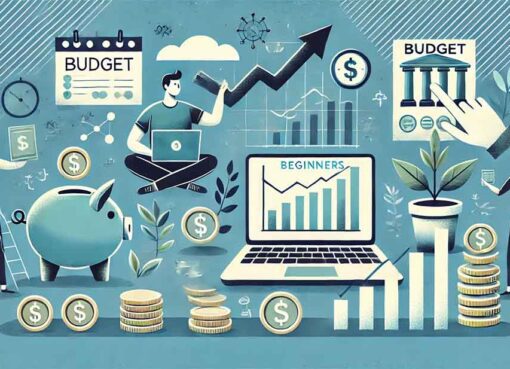Tips for Saving Money

Tips for Saving Money: How to Get on the Right Track Financially.
Learning the art of saving money is a critical ability that can considerably enhance your financial health in a world where expenses seem to increase daily. These practical suggestions will help you on your path to wise and effective money management, whether you’re saving for a major purchase, creating an emergency fund, or aiming for long-term financial stability.
Make a budget and follow it.
A well-structured budget is the basis of efficient money management. List your monthly income and all of your outgoing costs, dividing them into mandatory (such as rent, food, and utilities) and optional (such as entertainment, eating out, and shopping) expenditures. Make sure your expenses don’t outweigh your income, and set aside a percentage of your money as soon as possible for savings.
Maintain a Spending Log.
Pay close attention to your spending patterns. By keeping track of your spending, you can find wasteful expenses that can be reduced. You may track your expenditure with the aid of a number of apps and programs, which will make it simpler for you to maintain accountability.
Create a fund for emergencies.
Because life is erratic, unanticipated expenses could occur at any time. Having an emergency fund can save you money. For those unexpected expenses, try to put aside three to six months’ worth of living expenses in a separate savings account.
Put high-interest debt first.
Pay attention to paying down any high-interest debt you may have, such as credit card balances, as soon as possible. Debts with high interest rates can quickly mount up and impede your financial development. Increase your spending on these loans while only making the minimum payments on your lower-interest bills.
Home Cooking.
Spending money on eating out might be expensive. Making meals at home allows you to choose healthier foods while also saving money. To avoid making unnecessary purchases, make a grocery list and stick to it by planning your meals.
Cut Back on Unneeded Subscriptions.
Review any monthly subscriptions you have, such as those for publications, streaming services, or gym memberships. Cancel the ones you don’t use frequently or won’t miss. Over time, the savings can build up to be quite a bit.
Shop responsibly.
Consider whether you need something or if it’s a want before making a buy. Delay hasty purchases so you have time to decide whether the item is actually necessary. To get the greatest prices on the things you actually need, look for sales, discounts, and coupons.
Purchase generic names.
Generic or store brands frequently provide name brand quality at a fraction of the cost. Purchasing generic brands of home goods and groceries can help you save a lot of money over time.
Shut off devices and save energy.
Utilize energy-efficient appliances and unplug electronics when not in use to reduce energy expenditures. Simple routines, such as turning off the lights when leaving a room and regulating the thermostat, can result in significant electricity bill savings.
Take the public transportation or rideshare.
Use public transit or carpool to get to work or social gatherings if at all possible. This not only lowers your fuel costs but also helps create a greener world.
Dispute Services and Bills.
Negotiate prices for services and invoices with no fear. Find out if there are any discounts or special offers by getting in touch with your service providers, such as cable, internet, or insurance firms. Mentioning your length of loyalty to the brand doesn’t hurt.
Shopping used.
Secondhand shops and internet marketplaces can provide excellent discounts on gently worn goods, from apparel to furniture. Finding unusual items can be cheap and enjoyable when you browse at thrift stores.
Streamline Savings.
Set up automatic deposits to your savings account so that they happen as soon as your paycheck arrives. The only way to ensure that you continuously save money before spending it on other things is to treat it as a non-negotiable expense.
DIY Whenever possible, try to complete do-it-yourself projects to save money. Using your creativity may be rewarding and cost-effective, whether you’re fixing small household problems or making gifts.
Reduce ATM fees.
To prevent excessive ATM costs, make sure to utilize ATMs that are part of your bank’s network in advance. These charges can seem insignificant, but they can add up over time.
Reduce Impulse Purchases.
Your budget can suffer if you make impulsive purchases. Establishing a “cooling-off” interval will help to combat this. Wait 24 hours before making an impulsive purchase if you’re tempted. The initial urge frequently wanes.
Benefit from Cashback Rewards.
When making purchases you would have made anyhow, use credit cards that give cashback rebates. To prevent interest charges, just make sure you pay off your bill completely each month.
Purchase or Rent In lieu of purchasing.
Consider renting or borrowing products you will only need momentarily rather than purchasing them. Tools, equipment, literature, and even formal clothing fall under this category.
Reduce your vices.
Cutting back on or giving up pricey vices like smoking or frequenting coffee shops can have a big impact on your financial situation.
Make a shopping itinerary.
Before going to the store, make a list of what you need to buy and follow it. This helps you stay focused on what you actually need while preventing impulse purchases.
Sell old things.
Sell goods you no longer need to declutter your home and get a little additional money. Connecting with potential customers is simple thanks to online marketplaces.
Compare insurance prices.
Costs for insurance might differ significantly between providers. To get the greatest deals for your needs on auto, house, and health insurance, shop around.
Avoid paying too much for credit.
To be eligible for low interest rates on loans and credit cards, keep your credit score high. To avoid unforeseen expenses, pay your payments on time and maintain a low credit utilization rate.
Spend money on yourself.
Although it may seem contradictory, spending money on your education and abilities can eventually increase your earning potential. Continuous learning can be beneficial in the long run, whether it involves workshops, online classes, or certificates.
Tips for saving money: Expert Tips for Smarter Financial Choices
Conclusion.
Tips for saving money. Spending less is one way to save money, but another is to make decisions that are in line with your financial objectives. You may build a strong foundation for monetary stability and a brighter future by putting these suggestions into practice. Always keep in mind that even little adjustments can result in large savings, and that every step you take toward better money management is a step toward greater financial security.





